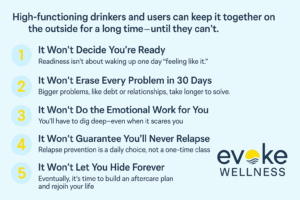If you’re a high-functioning drinker or user, you already know how to keep it together on the outside. You can hold a job, manage a family, and keep the wheels turning while hiding the chaos inside. You’ve mastered the art of damage control—until you haven’t.
That’s usually when the thought of a residential treatment program shows up. Maybe it’s after a close call at work. Maybe it’s because someone you care about is threatening to walk away. Or maybe it’s just the bone-deep exhaustion of pretending everything’s fine.
Here’s the reality: treatment can give you structure, support, and a game plan. But it’s not a magic fix. If you’re going to do this, you need to know the 5 things no residential program can do for you.
1. It Won’t Decide You’re Ready
You can be dragged into treatment by an employer, a spouse, or your own mounting consequences—but no one can make you want to change. Readiness isn’t about waking up one day “feeling like it.” It’s about being willing to start, even if you’re scared or stubborn.
One former client told us, “I didn’t think I was ready. I just knew I couldn’t keep doing what I was doing. That was enough.”
A residential program can open the door and keep it open. But you have to walk through it—and keep walking when it gets uncomfortable.
2. It Won’t Erase Every Problem in 30 Days
A 30-day program can change your life. But it won’t rewrite your entire story in one chapter. The bills will still be there. Your relationships may still need repair. And your emotions—though steadier—will still need tending.
What treatment does is give you a solid foundation to face those things without running back to your old habits. Think of it like learning how to box: you don’t step into the ring on day one. You train, you practice, you build your reflexes so when life swings at you, you’re ready.
If you stay longer—60 or 90 days—you get more time to build those reflexes. But the real test comes when you’re back in your everyday environment.
3. It Won’t Do the Emotional Work for You
Detox clears your body. Therapy clears your mind. But no one can clear the pain you’ve been avoiding except you.
For high-functioning people, the temptation is to treat therapy like another performance—saying just enough to look engaged without actually going deep. The problem is, surface work gets surface results.
One client admitted, “It wasn’t until my counselor called me out—said I was giving her the LinkedIn version of my life—that I started telling the truth. That’s when things started to shift.”
Treatment gives you space and support for the hard conversations. But you have to choose honesty over image.
4. It Won’t Guarantee You’ll Never Relapse
Even the best residential program can’t make a lifetime guarantee. You’ll leave with tools—like how to spot your triggers, how to cope with stress, and how to ask for help—but those tools only work if you use them.
Relapse prevention is a daily choice. Some days, you’ll feel confident. Other days, you might be one bad mood away from wanting to pick up again. The work is in recognizing that moment and choosing differently—over and over.
Your team can create a game plan. You’re the one who has to run it.
5. It Won’t Let You Hide Forever
A lot of high-functioning people think of treatment as a break from the pressure—a place to hide while life calms down. And yes, there’s safety in the bubble. But good residential care is designed to prepare you, not protect you forever.
At Evoke Wellness at Cohasset, that means we’re always thinking about your exit strategy. From day one, we’re helping you build an aftercare plan: therapy, support groups, lifestyle changes, maybe sober housing.
You’ll leave stronger than you came in—but the point is to rejoin your life, not to avoid it.
Why This Matters for High-Functioning People
High-functioning addiction comes with a built-in trap: you’re used to controlling the narrative. You may think you can “game” treatment the way you’ve gamed deadlines, social expectations, or even your own body.
But the truth is, the same intelligence and drive that kept you afloat in addiction can make you unstoppable in recovery—if you use them. That’s why a residential treatment program isn’t about doing everything for you. It’s about teaching you to do the right things for yourself.
FAQs About Residential Treatment for High-Functioning Clients
1. Will I lose my job if I go to treatment?
In many cases, no. Laws like the Family and Medical Leave Act (FMLA) can protect your job while you take time for medical treatment, including addiction recovery. Our admissions team can help you navigate this.
2. Can I keep my phone and laptop?
Policies vary. Some programs limit access early on to help you focus. Others allow scheduled use. The goal isn’t to cut you off from life—it’s to give you space to focus on yours.
3. Will people know why I’m gone?
You control your own disclosure. You can simply say you’re taking medical leave. If you choose to share more, that’s your call.
4. What if I feel out of place?
High-functioning clients often worry they won’t relate to others in treatment. In reality, addiction doesn’t discriminate. Many clients are professionals, parents, and community leaders who understand exactly where you’re coming from.
5. How will I know if it’s working?
You’ll start to notice shifts: clearer thinking, steadier mood, better sleep, fewer cravings. The real proof is when you begin responding differently to stress and triggers.
6. What happens when I leave?
You’ll leave with a personalized aftercare plan—therapy appointments, support group connections, lifestyle recommendations—so you’re not walking out alone.
7. What if I don’t want group therapy?
Group work is a key part of treatment, but it’s balanced with one-on-one counseling. Many high-functioning clients find group unexpectedly valuable once they experience it.
The Bottom Line
A residential treatment program can give you every advantage—expert care, proven tools, a safe environment—but it can’t make your recovery for you. That part is up to you.
If you’re done holding everything together while falling apart inside, it’s time to stop doing it alone. The life you’ve been building in public can finally match the one you live in private.
Call 866-931-6429 or visit our Residential treatment program services in Cohasset, MA to see how we can help you start—and own—your recovery.





